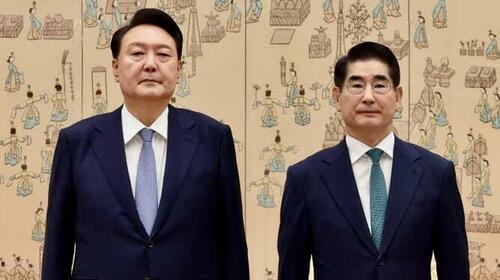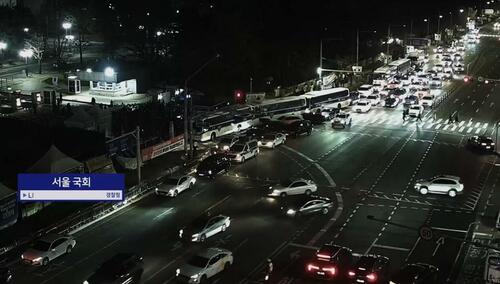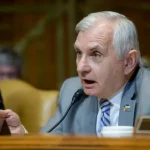
South Korea continues to be rocked by aftershocks in the wake of President Yoon Suk Yeol's aborted declaration of marital law. In a trio of jarring new developments, the country's top two law enforcement officers have been arrested, the former defense chief attempted suicide in detention, and police raided the president's office -- all while a second impeachment vote looms this weekend with greater prospects for success.
Late on Tuesday, police arrested South Korea's former Defense Minister Kim Yong-hyun, who resigned on Thursday after a warrant was issued for his arrest for his alleged role in aiding Yoon's martial law attempt. He then tried killing himself shortly after midnight in a detention center bathroom. His attempt was thwarted by a "control room staff member," according to a report from the commissioner general of the Korea Correctional Service, and he's said to be under close monitoring and in good health.

The first to be arrested over the constitutional crisis, Kim faces charges of “engaging in critical duties during an insurrection” and “abuse of authority to obstruct the exercise of rights.” A guilty verdict on the insurrection charge would expose Kim to a maximum penalty of death by hanging. While his method of suicide-attempt hasn't been disclosed, it seems Kim wanted to skip the proceedings and administer his own form of justice.
Wednesday also brought word that South Korea's two senior-most law enforcement officers have been arrested on insurrection charges. National Police Commissioner Cho Ji-ho and Seoul metropolitan police chief Kim Bong-sik are behind bars at Seoul’s Namdaemun police station, according to the South China Morning Post.
South Korean soldiers are stationed outside the Parliament. Unbelievable to see how a democracy descends into a chaos and tyranny so fastpic.twitter.com/IZkRK6mxJe https://t.co/QBmQl1OaFv
— Guy Elster (@guyelster) December 3, 2024
The two top cops are in hot water for deploying police to impede lawmakers who were trying to make their way into the parliament building to counteract Yoon's martial law declaration. Then-Defense Minister Kim deployed soldiers to the same location. On Tuesday, Kim issued a statement taking responsibility for his actions and seeking to shield subordinates from consequences for their actions:
"All responsibility for this situation lies solely with me. My subordinates were simply faithful in following my orders and the missions that were given to them. I ask for leniency for them."
On Monday, the Justice Ministry banned Yoon from traveling overseas, at the request of police, prosecutors, and an anti-corruption agency. As the investigation intensified, President Yoon's office was raided by police on Wednesday, as they sought evidence relating to his attempted imposition of martial law and the accompanying suspension of civil liberties and governmental checks and balances.
The office search, which has been reported by local media but not yet confirmed by police or the president's office as this is written, flies in the face of previous assurances by observers that the presidential security service would thwart any such raid. They'd pointed to a law barring the search of areas that hold state secrets without the consent of those responsible for such spaces.

The rolling crisis began on Dec. 3, when Yoon stunned South Korea and the international community with a late-night declaration of martial law, which he claimed was necessary to “rebuild and protect” the country, and prevent it from “falling into the depths of national ruin.” The move came after an impasse over the country's 2025 budget, and the attempted impeachment of three top prosecutors. In his announcement, Yoon railed against “shameless pro-North-Korean anti-state forces who are plundering the freedom and happiness of our citizens...I will eliminate anti-state forces as quickly as possible and normalize the country.”
watching the citizens of South Korea revolt against martial law is so badass this woman is a legendpic.twitter.com/TZgUqtrhPt
— Omni ☕️ (@InfernoOmni) December 3, 2024
As soldiers and police surrounded the National Assembly, the South Korean parliament's speaker used his YouTube channel to summon legislators. All 190 who heeded the call voted to repeal the martial law declaration. Six hours after his shocking announcement, Yoon apologized for the move and retracted it, saying he'd acted out of "desperation."
An impeachment vote last weekend failed in the face of a boycott by the ruling People Power Party (PPP), but the Democratic Party (DP) has announced it will move for impeachment again on Saturday, and some PPP members are now voicing their support. Success requires a two-thirds majority of the 300-member assembly. DP leader Lee Jae-myung voiced confidence: "The impeachment train has left the platform. There is going to be no way to stop it,"
South Korea continues to be rocked by aftershocks in the wake of President Yoon Suk Yeol’s aborted declaration of marital law. In a trio of jarring new developments, the country’s top two law enforcement officers have been arrested, the former defense chief attempted suicide in detention, and police raided the president’s office — all while a second impeachment vote looms this weekend with greater prospects for success.
Late on Tuesday, police arrested South Korea’s former Defense Minister Kim Yong-hyun, who resigned on Thursday after a warrant was issued for his arrest for his alleged role in aiding Yoon’s martial law attempt. He then tried killing himself shortly after midnight in a detention center bathroom. His attempt was thwarted by a “control room staff member,” according to a report from the commissioner general of the Korea Correctional Service, and he’s said to be under close monitoring and in good health.

The first to be arrested over the constitutional crisis, Kim faces charges of “engaging in critical duties during an insurrection” and “abuse of authority to obstruct the exercise of rights.” A guilty verdict on the insurrection charge would expose Kim to a maximum penalty of death by hanging. While his method of suicide-attempt hasn’t been disclosed, it seems Kim wanted to skip the proceedings and administer his own form of justice.
Wednesday also brought word that South Korea’s two senior-most law enforcement officers have been arrested on insurrection charges. National Police Commissioner Cho Ji-ho and Seoul metropolitan police chief Kim Bong-sik are behind bars at Seoul’s Namdaemun police station, according to the South China Morning Post.
South Korean soldiers are stationed outside the Parliament. Unbelievable to see how a democracy descends into a chaos and tyranny so fastpic.twitter.com/IZkRK6mxJe https://t.co/QBmQl1OaFv
— Guy Elster (@guyelster) December 3, 2024
The two top cops are in hot water for deploying police to impede lawmakers who were trying to make their way into the parliament building to counteract Yoon’s martial law declaration. Then-Defense Minister Kim deployed soldiers to the same location. On Tuesday, Kim issued a statement taking responsibility for his actions and seeking to shield subordinates from consequences for their actions:
“All responsibility for this situation lies solely with me. My subordinates were simply faithful in following my orders and the missions that were given to them. I ask for leniency for them.”
On Monday, the Justice Ministry banned Yoon from traveling overseas, at the request of police, prosecutors, and an anti-corruption agency. As the investigation intensified, President Yoon’s office was raided by police on Wednesday, as they sought evidence relating to his attempted imposition of martial law and the accompanying suspension of civil liberties and governmental checks and balances.
The office search, which has been reported by local media but not yet confirmed by police or the president’s office as this is written, flies in the face of previous assurances by observers that the presidential security service would thwart any such raid. They’d pointed to a law barring the search of areas that hold state secrets without the consent of those responsible for such spaces.

The rolling crisis began on Dec. 3, when Yoon stunned South Korea and the international community with a late-night declaration of martial law, which he claimed was necessary to “rebuild and protect” the country, and prevent it from “falling into the depths of national ruin.” The move came after an impasse over the country’s 2025 budget, and the attempted impeachment of three top prosecutors. In his announcement, Yoon railed against “shameless pro-North-Korean anti-state forces who are plundering the freedom and happiness of our citizens…I will eliminate anti-state forces as quickly as possible and normalize the country.”
watching the citizens of South Korea revolt against martial law is so badass this woman is a legendpic.twitter.com/TZgUqtrhPt
— Omni ☕️ (@InfernoOmni) December 3, 2024
As soldiers and police surrounded the National Assembly, the South Korean parliament’s speaker used his YouTube channel to summon legislators. All 190 who heeded the call voted to repeal the martial law declaration. Six hours after his shocking announcement, Yoon apologized for the move and retracted it, saying he’d acted out of “desperation.”
An impeachment vote last weekend failed in the face of a boycott by the ruling People Power Party (PPP), but the Democratic Party (DP) has announced it will move for impeachment again on Saturday, and some PPP members are now voicing their support. Success requires a two-thirds majority of the 300-member assembly. DP leader Lee Jae-myung voiced confidence: “The impeachment train has left the platform. There is going to be no way to stop it,”
Loading…






